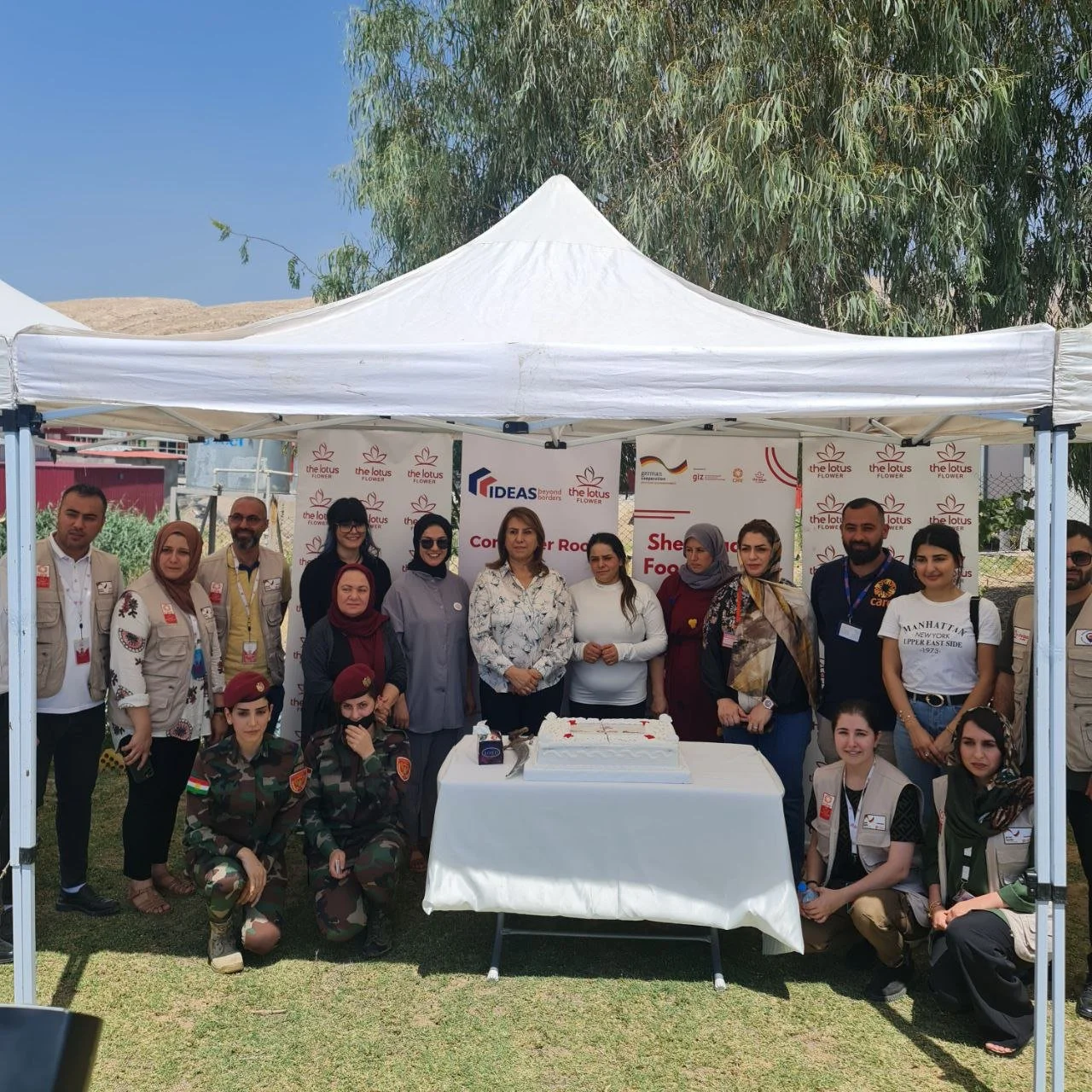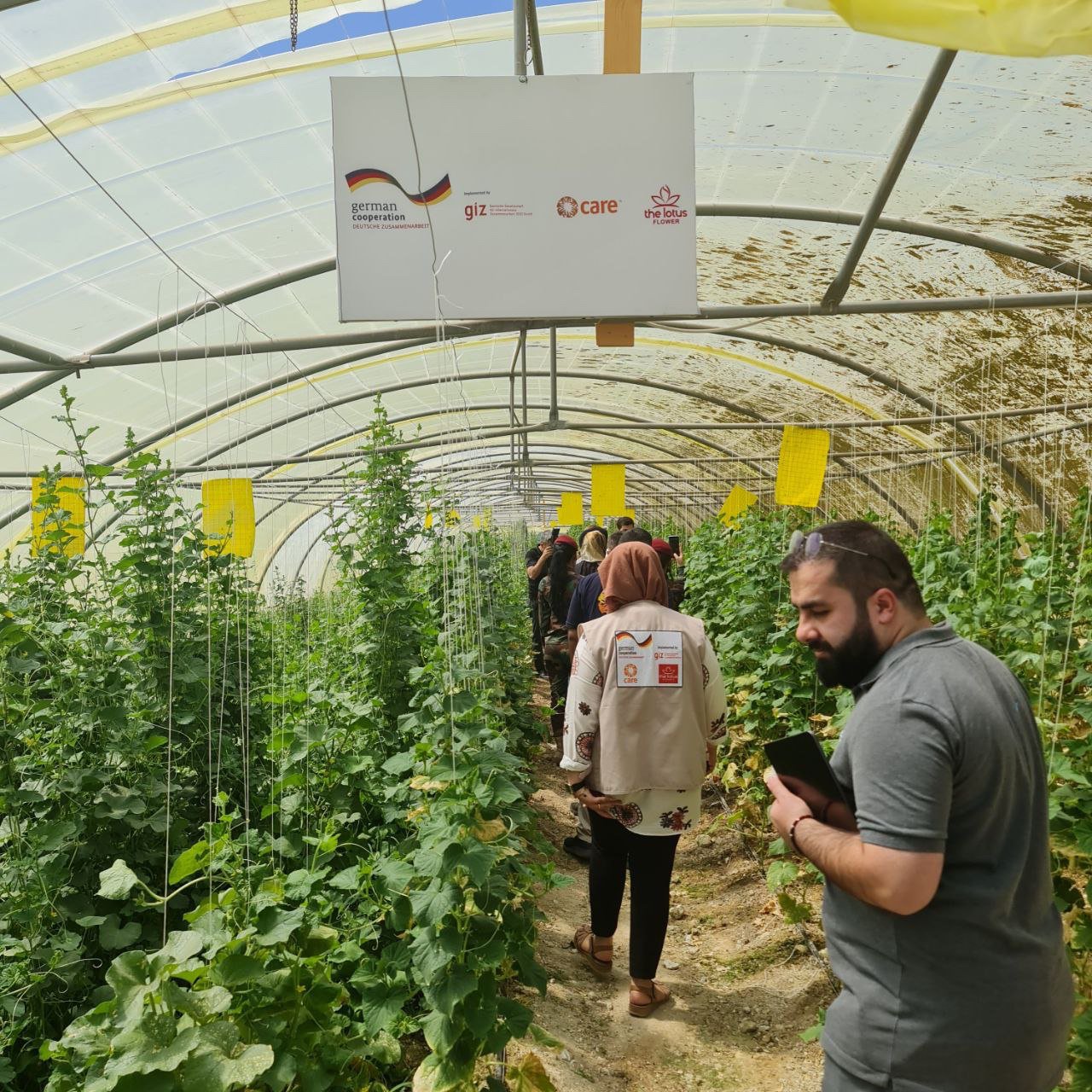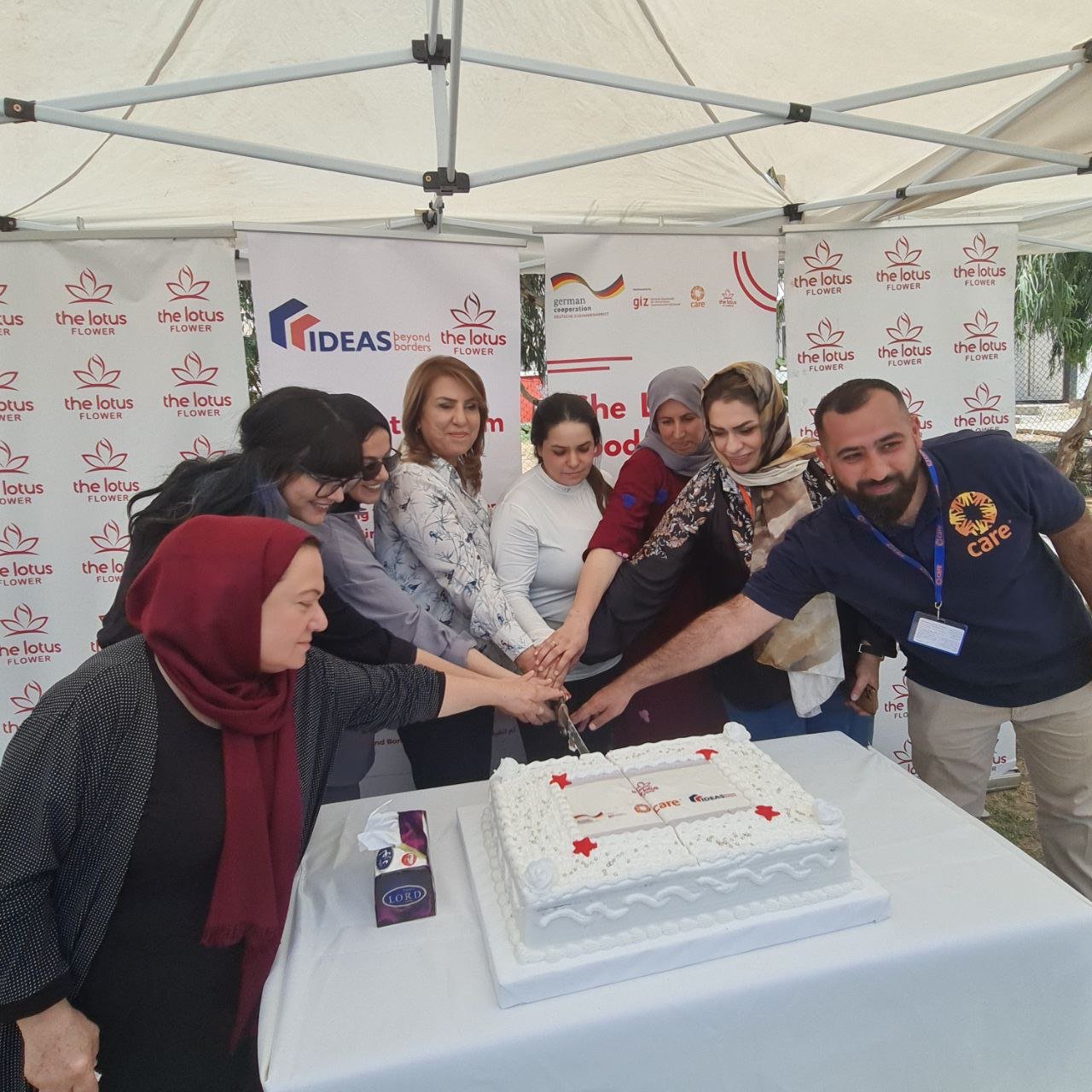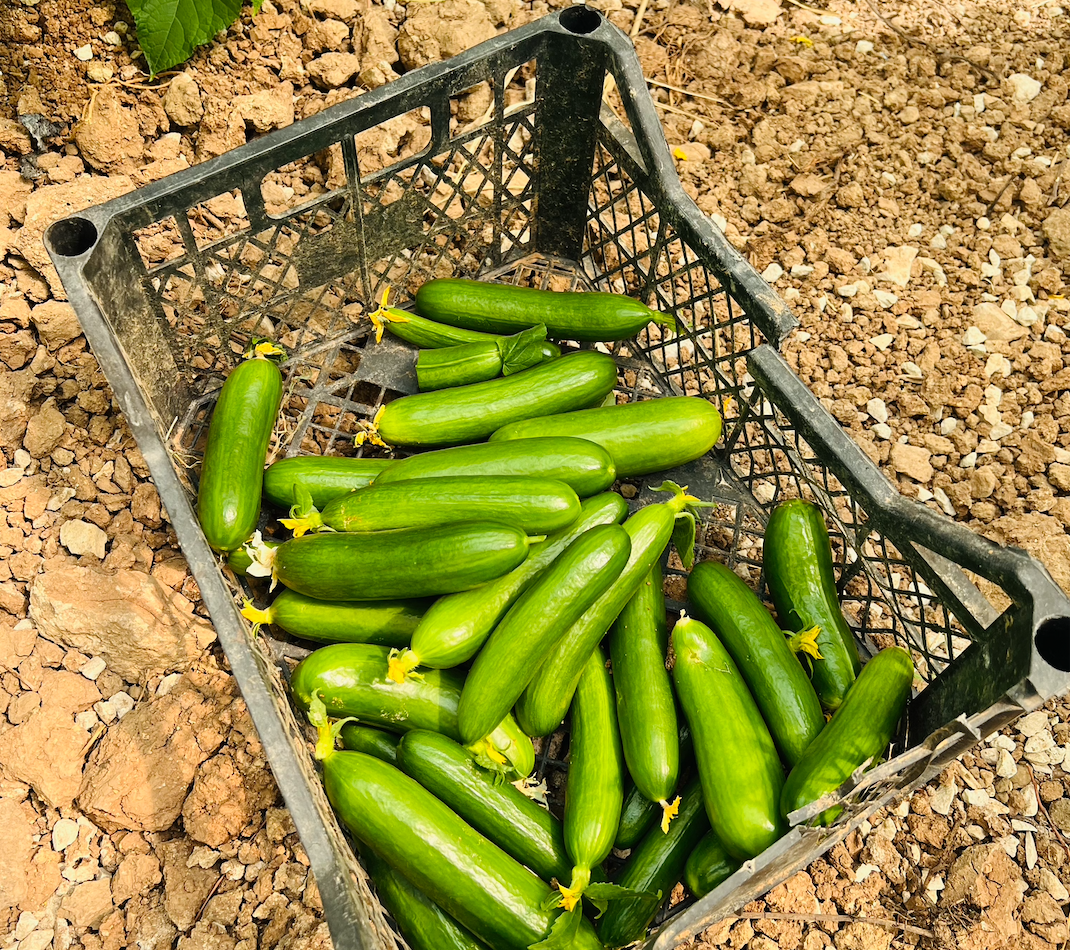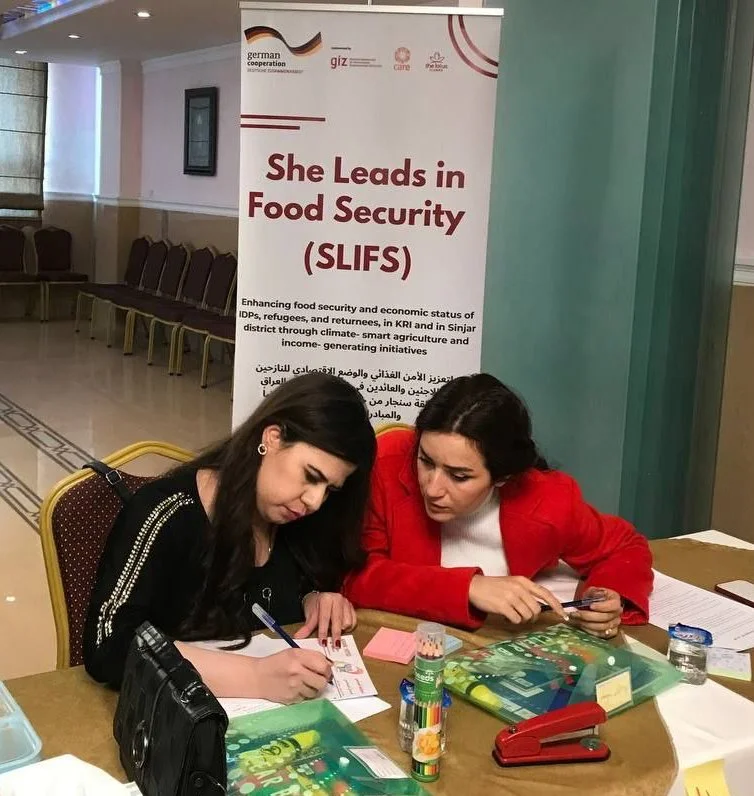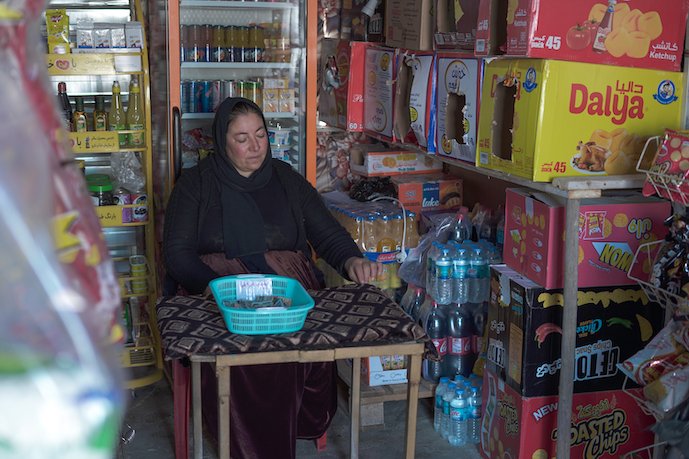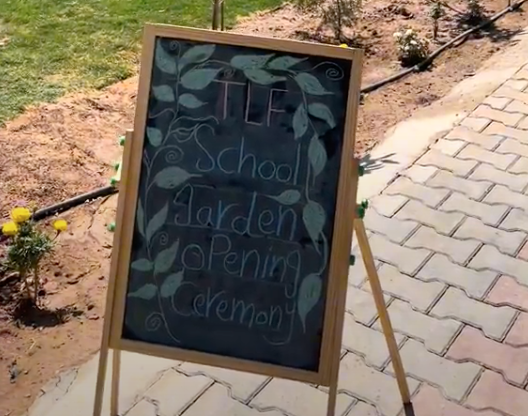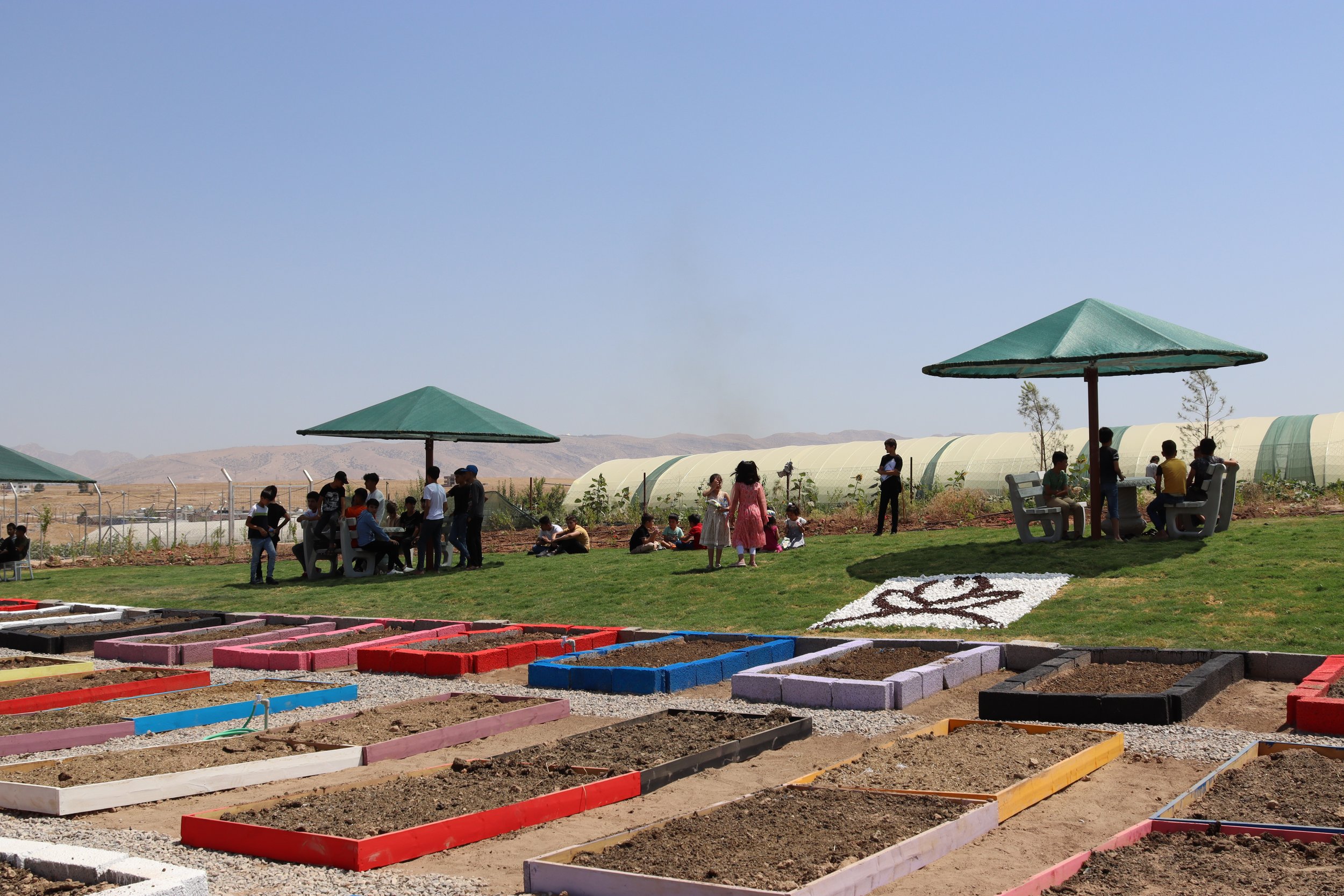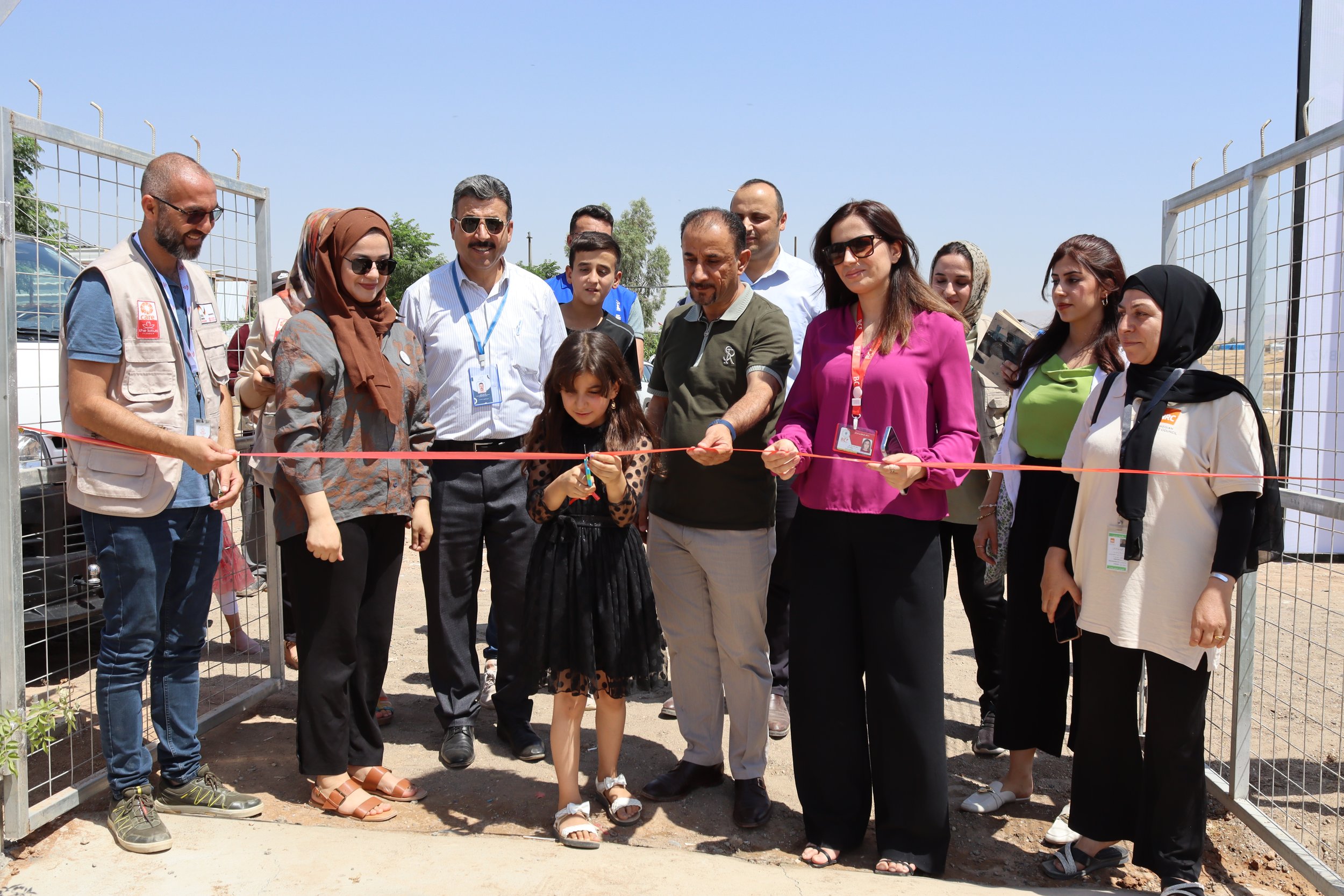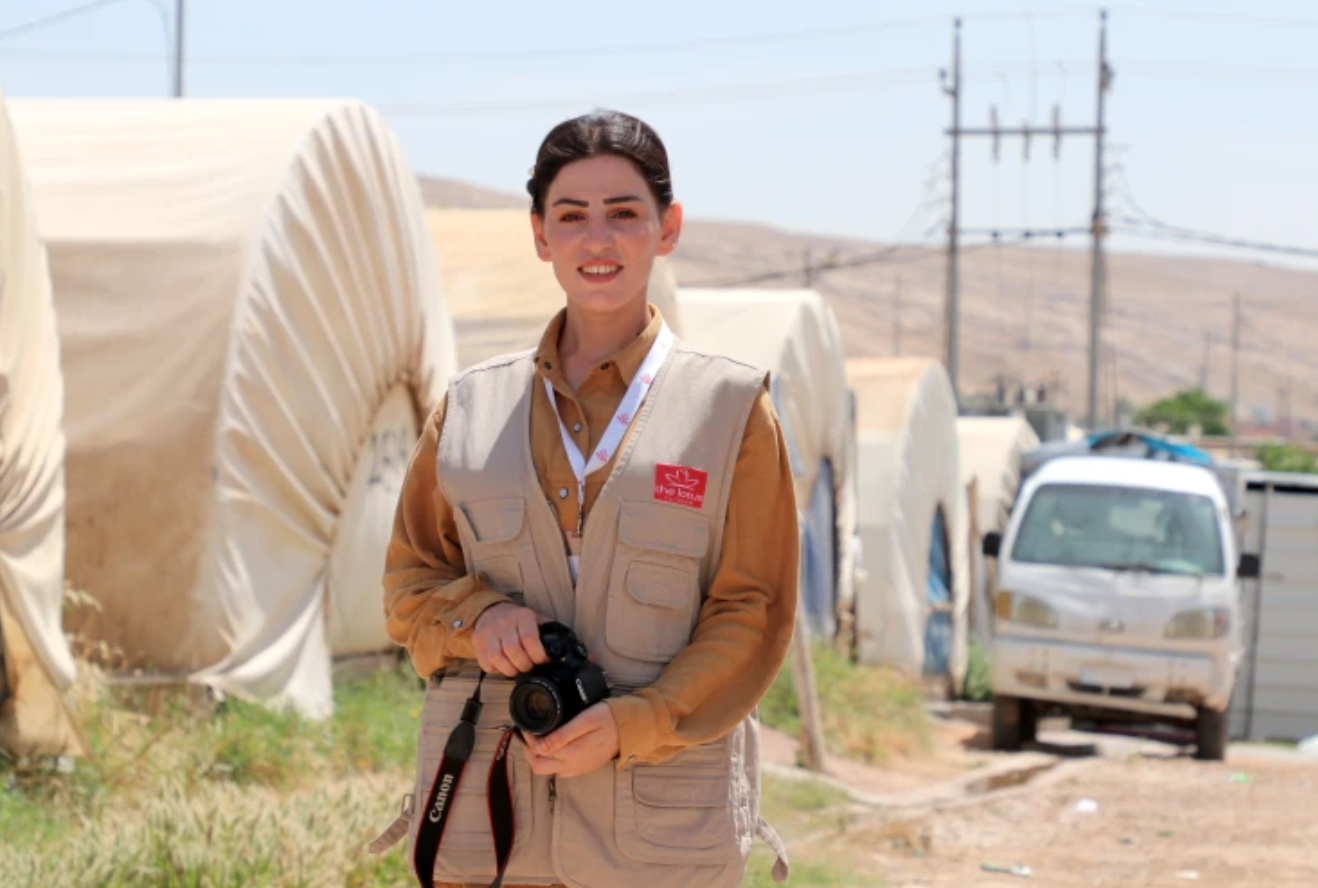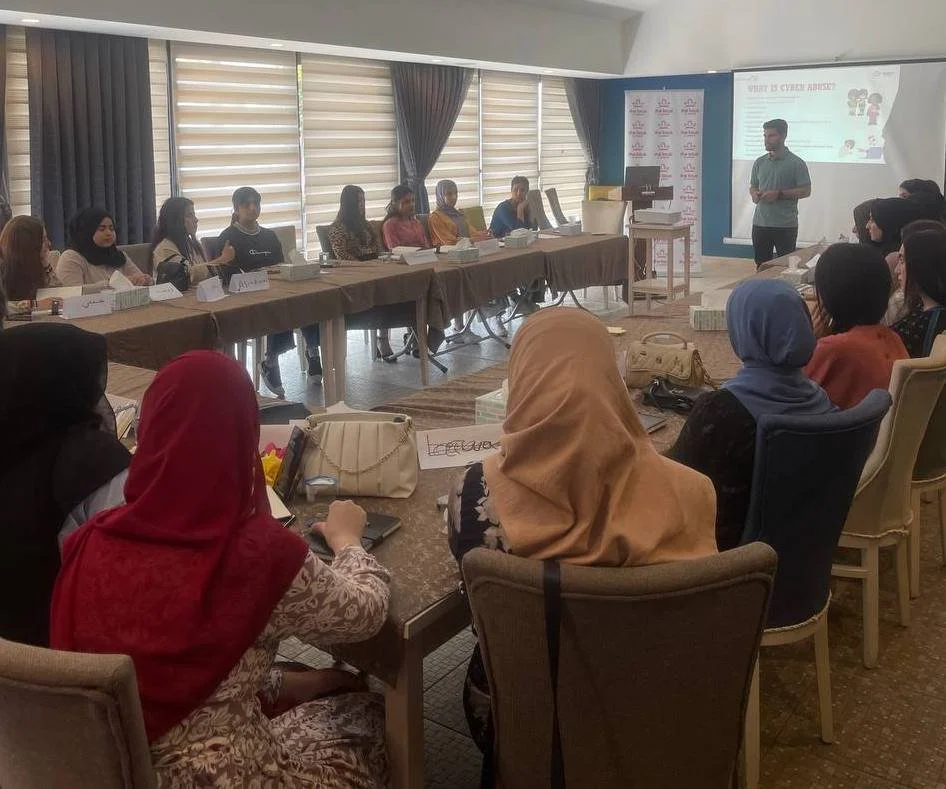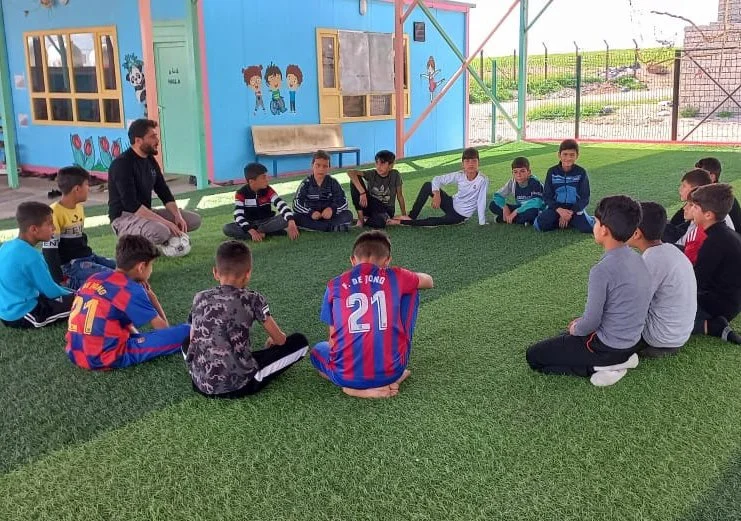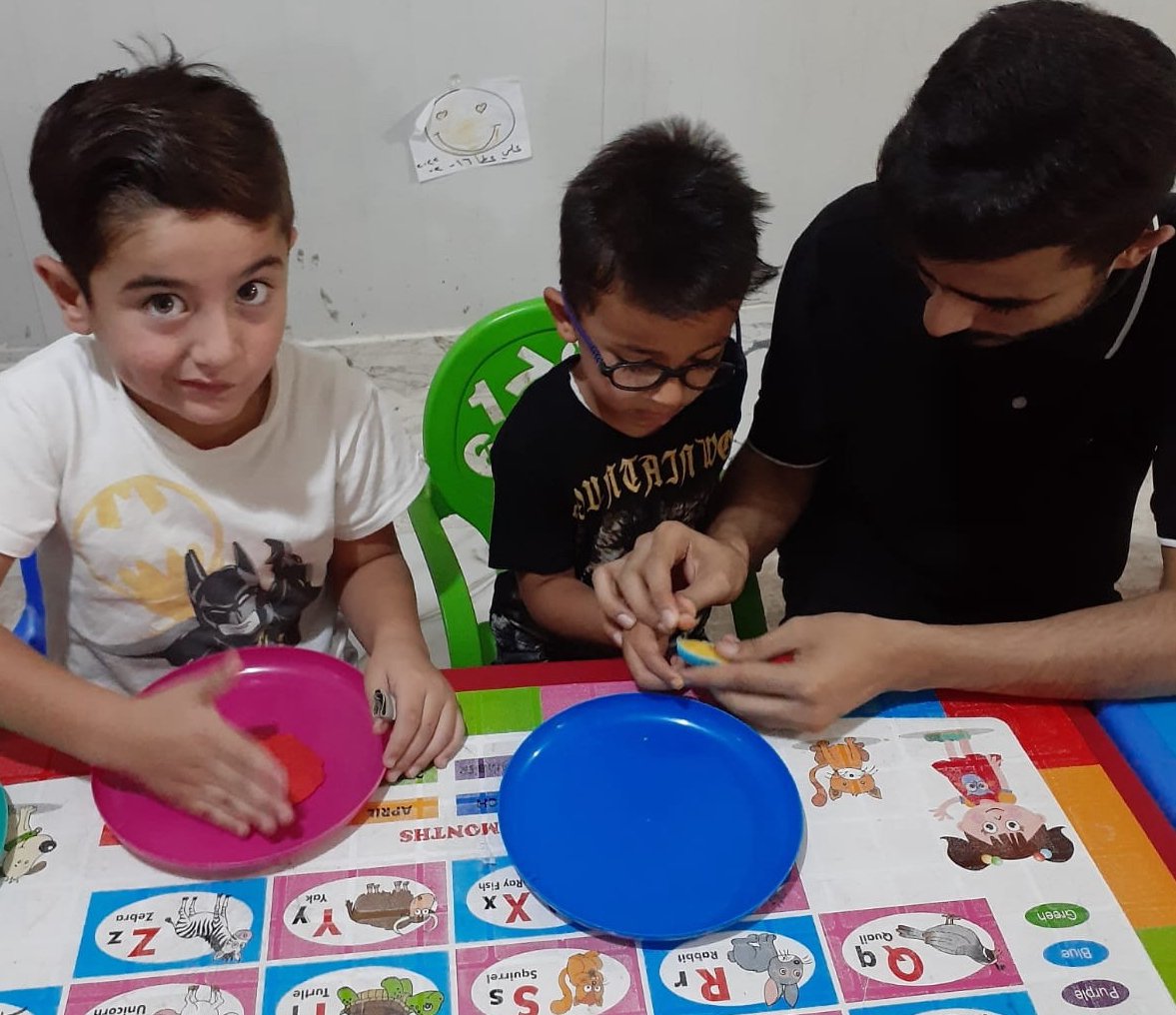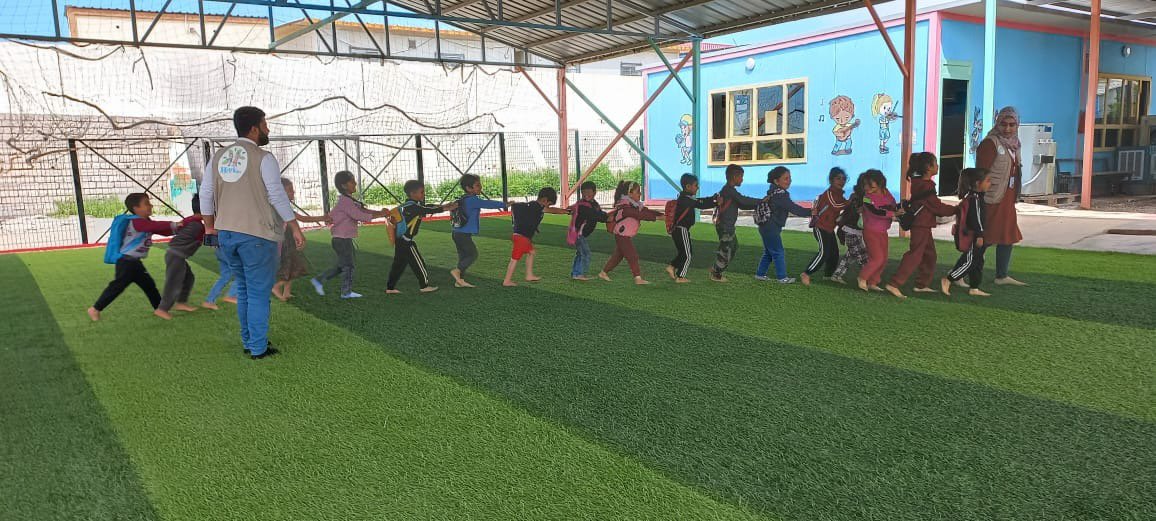Meet the team: Rougesh from our Child Protection project
Rougesh is Psychosocial Activities Supervisor, working on our Child Protection programme with UNHCR.
During the conflict, she had to quit her studies at university in Damascus in Syria, and in July 2012 survived a terrifying airstrike that hit her family’s home. Then, when they fled, their bus was attacked by militia and they narrowly escaped another huge explosion.
Rougesh began working as a volunteer in the humanitarian sector, specialising in Child Protection, and she later became a facilitator for a large international NGO. After spending almost nine years working with vulnerable children in various different roles, she applied to work within the Lotus Flower’s Child Protection project funded by UNHCR, and after being successful in her interview, began working as PSS Activities supervisor with us in January this year.
Here we find out what she makes of her role…
What's the best thing about your job, Rougesh?
"Everything is good about my job! But especially seeing the smiles on children's faces. The activities we do in out-of-camp areas are also new to the children, and that makes me happy too."
Tell us something that we might not know about your role?
"Working within the host community is a new experience for me, and it’s also been my first time to supervise four host community staff and also the beneficiaries. It has been a new and joyful experience for me.”
Can you remember any time when you feel that you’ve personally made a difference?
"One nice story about my role is that I helped save a girl from child marriage when she was only 12 years old. She still sends me letters telling me how grateful she is that we could make this change in her life.”
Finally, what do you hope to achieve through your work in future?
"I hope to deliver Child Protection services in new locations and help grow the Lotus Flower within the community. I’d also like to help stop Child Protection concerns everywhere in the world."
Our first Earth Sisters receive training on climate change and GBV
As you can see in these images, our first cohort of Earth Sisters have been undergoing training on climate change and gender-based violence topics.
Supported by the German Federal Foreign Office in Erbil, our important new project aims to upskill and increase the capacity of women and girls in Duhok city on various climate change issues and their known links to gender-based violence.
It’s part of our core Climate Change pillar, which we launched earlier this year in recognition of the growing need for climate action in Iraq.
Once all 50 Earth Sisters have completed the training element, they will lead a range of their own initiatives to raise community awareness about key environmental issues affecting the region. These initiatives will of course be facilitated and supported by the Lotus Flower itself.
Our six-month Earth Sisters project is especially important since the Global Environmental Outlook in 2019 ranked Iraq as the fifth most vulnerable country to the effects of climate change. As cited by the World Bank, the country faces the impacts of large population growth, multiple wars, climate changes and poor land planning, while higher temperatures and decreasing rainfall re also having an impact. Additionally, there are predictions that Iraq could suffer a 20% drop in water resources by 2050, coupled with a doubling of the population to 80 million.
And as UN Women stated in a report in February 2022, climate change is a ‘threat multiplier’, which escalates social, political and economic tensions in conflict-affected settings, meaning that “women and girls face increased vulnerabilities to all forms of gender-based violence, including conflict-related sexual violence, human trafficking, child marriage, and other forms of violence.
Ultimately, our Earth Sisters will serve as local ambassadors to increase community awareness of the escalating climate emergency, and promote sustainable solutions and badly-needed environmental adaptations.
We’ll be sure to share more updates as the project impact grows…
SUPPORT OUR CLIMATE WORK
Our new Power Girls Gym and Computer Room open
We were so pleased to hold an official opening ceremony to showcase our newly-added facilities for women and girls at Essyan camp recently.
With generous funding from Ideas Beyond Borders, we have opened a new Computer Room, which is equipped with laptops to enable those we support to get online, improve their tech skills and be part of the digital world.
And thanks to kind support from Care Iraq, we have launched the Power Girls Gym, where women and girls can exercise and keep fit and healthy in a safe and welcoming space.
During the grand opening event, we also took the opportunity to formally unveil our eight renovated greenhouses for women to grow their own vegetables and earn incomes. The greenhouses are part of our She Leads in Food Security project which is being delivered in partnership with Care Iraq through funding from Deutsche Gesellschaft fürInternationale Zusammenarbeit (GIZ) GmbH.
As part of the grand opening event, we were joined by some very special guests, including Dr. Khanzad Ahmad, Secretary General of Kurdistan’s High Council for Women and Development, as well as representatives from our partners at Care and Ideas Beyond Borders, plus AVSI and VOP.
There were also musical performances by a group of our talented young musicians, speeches and a huge celebratory cake for all to enjoy. The event was also covered by local media including Kurdistan 24 TV, who interviewed our Regional Director Vian about our projects and these new facilities.
We are so proud of these new openings and the hard work that has gone into making the vision a reality, and we’re delighted that so many in the community at Essyan will benefit from them…
How we support the 2030 Sustainable Development Goals
The Sustainable Development Goals (SDGs) for 2030 are a huge call to action to the world to end poverty and inequality, protect the planet, and ensure that everyone can enjoy health, justice and prosperity.
After formally launching in 2016, the 17 Goals comprise 169 ambitious targets, which together aim to ensure that no one is left behind. And unlike other previous targets, the Goals are unique in that they call for action by all countries: poor, rich and middle-income.
If you weren’t aware of it, all of our work and projects have been designed to align as closely as possible to the SDGs, and we thought it might be helpful to explain how…
No Poverty (SDG 1)
We provide a raft of livelihoods opportunities to enable women and girls to earn incomes and move out of poverty. This includes programmes like Baking Sisters, Sewing Sisters, Jam Sisters and our Lotus Café. We also offer small business training and financial grants for women to start their own businesses through our Women’s Business Incubator.
Good Health and Wellbeing (SDG 3)
Most of our projects include mental health support with trained psychologists, through individual and group therapy sessions, as well as case referrals where required. We also provide holistic support through yoga, art and music therapy, and regular fitness classes to support overall wellbeing and healing.
Quality Education (SDG 4)
We firmly believe in ensuring educational opportunities are accessible to everyone, and we provide regular adult literacy and English language classes, as well as computing and upskilling.
Gender Equality (SDG 5)
All of our work is steeped in gender equality, and every project and programme is geared towards increasing women and girls’ participation. We also strive to develop opportunities for women’s leadership and equal roles, and advocate for their basic rights at every level.
Decent Work and Economic Growth (SDG 8)
As with SDG 1 on No Poverty, we provide livelihoods and training opportunities, plus small business grants to enable women and girls to begin supporting themselves and their families and earn a fair wage. Our educational classes - such as adult literacy, computing and English - mean those we reach have improved skillsets and are better equipped to access decent employment opportunities.
Reduced Inequalities (SDG 10)
All of our work is geared towards empowering women and girls and reducing ingrained inequalities that have impacted on them for generations. As an example, we run campaigns and events to mark occasions such as International Women’s Day, 16 Days of Activism and World Refugee Day.
Sustainable Communities (SDG 11)
Our educational and livelihoods support aims to contribute to more sustainable communities by ensuring women and girls can take control of their own lives and thrive on their own terms through accessible employment and learning opportunities. Our work is also based on what women and girls tell us they need, rather than what we assume they need - and our projects are always designed to serve as a hand-up, not a hand-out.
Climate Action (SDG 13)
Our new Climate Change pillar provides sustainable agricultural livelihoods support – through food security initiatives such as our renovated greenhouses for women growers, small business grants and our Jam Sisters programme. Our She Leads in Food Security project also provides community awareness on environmental issues such as recycling, food preservation and nutrition.
Peace, Justice and Strong Institutions (SDG 16)
Our Peacebuilding and Human rights projects – such as Peace Sisters – aim to build more inclusive, tolerant societies, bringing together people from every different faith, culture and ethnicity. As part of this work, women and girls are trained to become peace mediators in their own communities, and take a more active role in rebuilding their communities.
support our projects and SDG work
Our greenhouse renovation project for women is thriving
Earlier this year, we undertook the renovation of eight greenhouses at Essyan camp which were kindly given to the Lotus Flower by AVSI.
After a huge amount of work, the greenhouses were repaired and cleaned, and then handed over to 40 displaced women, who have since been growing their own produce – not only to feed their families, but also to earn an income. The women also took part in our GET Ahead business training module, and financial support was provided so they could purchase the necessary plant and vegetable seeds and equipment. The women have additionally received expert training and mentoring on technical aspects.
Happily, in just a few months, the greenhouses have begun delivering fresh vegetables and healthy plants for the women - as you can see in these photos and the video at the bottom of this post.
The greenhouse initiative is part of our She Leads in Food Security Project, which is providing income-generating and agricultural initiatives, as well as awareness-raising around the climate crisis, the need for sustainable solutions and topics such as food waste and preservation, nutrition and composting.
The project is being delivered in partnership with CARE, funded by BMZ and implemented by Deutsche Gesellschaft für Internationale Zusammenarbeit (GIZ).
This project is especially needed since Iraq has been identified as fifth most vulnerable country to climate change globally due to decreased water and food availability, extreme temperatures and associated health problems. Increased socio and economic challenges, including the pandemic, devaluation of the Iraqi Dinar and impact of the Ukraine conflict on food prices, have all added to the challenges of IDPs and returnees in meeting basic food needs. Low rainfall and rising temperatures have sparked a water scarcity crisis, causing crops to fail and exacerbating the food security status of the vulnerable.
According to Iraq’s 2022 Humanitarian Needs Overview, more than 82% of in-camp IDPs are vulnerable to food insecurity and 55% of out-of-camp IDPs reported food to be among their priority unmet needs, with 50% of returnees reporting the same. High levels of aid dependency and lack of access to income puts people’s nutritional, health, and food security status at risk of further deterioration, resulting in negative coping strategies such as reliance on debt, reducing food intake, early marriage and child labour.
Accordingly, our She Leads in Food Security project aims to provide IDP and refugee women, girls and people with disabilities with improved food security, access to sustainable food income-generation and increased economic independency.
We are so proud of the way it is going so far, and will bring you more news on the programme soon.
Watch our video about the greenhouse renovation below…
The Lotus Flower granted UK independent charitable status
We’re so pleased to tell you that the Lotus Flower has received its independent charitable status here in the UK.
Previously, our organisation sat under a large umbrella charity, which collected funds on our behalf and whose governance we followed. But being independently registered with the Charities Commission for England and Wales now allows us to set up our own administration, governance and strategy.
As part of this, we now have our own Board of Trustees, who you can read about here. Each of our six Trustees bring a huge range of experience and specialist areas to the Lotus Flower, and we’re so happy to have them join us.
The Charities Commission is an independent, non-ministerial government department accountable to Parliament, which ensures that charities comply with all legal requirements and run as effectively as possible. Incidentally, our charitable number is 1203840, and you can see us on the register here.
Being independent marks a huge new step in the Lotus Flower’s growth, and it means we’re busily making lots of exciting plans for the future. We’ll share more about that with you as soon as we can!
Sisters' Stories: "I never believed that one day I would have my own business "
Gulistan is a 27-year-old woman who lives in Rwanga IDP camp. She had always dreamed of having her own hairdressing business, but despite plenty of experience of working in a salon, she had limited opportunities for growth and a lack of financial resources to pursue her entrepreneurial aspirations.
When she had the chance to take part in our womens’s business incubation project, which is supported by The Big Heart Foundation and Nama Women, that all changed for Gulistan.
Thanks to the project, she received a financial grant, along with small business training and mentorship to support her in launching her own salon. And happily, we’re able to share with you the news that her business is now up and running.
Not only was Gulistan able to find and secure a suitable location for her salon, but the grant also meant she could purchase high-quality equipment and invest in a range of haircare products. In addition, the training she received through the project equipped her with essential business skills such as marketing, customer service and financial management.
Gulistan's dedication and passion saw her work tirelessly to create a warm and welcoming environment in her salon, ensuring that every customer receives a professional and personalised service.
She says: “When I was working before, I never believed that one day I would have my own business and be able to run it myself. My dream came true when the Lotus Flower selected me and supported me to become a business owner and decision-maker within the community. I’m so grateful to every person who has helped me.”
As a successful entrepreneur, Gulistan is contributing to the economic growth of her community, and also inspiring other women to pursue their goals fearlessly. It’s another example of the transformative power of women in business, and the positive impact they can have on individuals, families, and the entire community.
By earning a sustainable living for themselves and their families, women’s confidence and self-esteem is boosted too, while attitudes and perceptions around women’s roles are changed for the better.
Gulistan is just one of 10 women who have been able to start their own business through this latest iteration of our incubator project, and we’ll share more about their stories soon too…
Can you support a woman’s business?
Apply now to take part in our new Earth Sisters project
We’re delighted to have launched a new project, Earth Sisters, with support from the German Federal Foreign Office through the German Consulate General in Erbil – and if you live locally, here is your chance to apply.
The project aims to upskill and increase the capacity of women and girls in Duhok city on various climate change issues and their correlation with Gender Based Violence-related topics.
Additionally, the project will support a range of initiatives led by the Earth Sisters which will raise community awareness about these pressing issues.
If you wish to be one of our first ever Earth Sisters and take this opportunity to participate in a series of training sessions as well as lead climate change and GBV-related initiatives in Duhok governorate, please fill out the application form here. Please note that this opportunity is solely for female applicants.
We are looking to recruit as soon as possible for the project, so please complete the form here by the end of July 20th at the very latest…
Please note the following criteria:
The project is for female participants only.
The age of participants should be between 17 to 35 years old.
The project is for IDPs, refugees, and those in host communities in and around Duhok city urban areas.
The project falls under our Climate Change pillar, which we launched earlier this years in order to help tackle the growing climate crisis in the region. Iraq is now fifth most vulnerable country in the world to climate change, and we firmly believe we must all do out bit to mitigate the risks…
Opening Ceremony for the Lotus Flower School Garden
We’re so proud to have held the grand opening ceremony for the Lotus Flower School Garden, which is an important new step in our climate-related work.
The garden serves as an environmental stewardship programme for young people, and is part of our She Leads in Food Security project, which is delivered in partnership with CARE Iraq, funded by BMZ and implemented by the Deutsche Gesellschaft für Internationale Zusammenarbeit (GIZ).
This environmental stewardship scheme aims to equip more than 80 youths with the knowledge and skills needed for them to become more connected to nature, and to take the lead in changing behaviours and attitudes towards climate change and the challenges it brings.
Our School Garden aims to improve food security, with raised beds so that youths can grow fresh vegetables. There is also an educational element to the garden, with a rich and diverse botanical zone, while healing is encouraged through shaded areas and flora.
Image credit: CARE Iraq
Image credit: CARE Iraq
After August 31, the Lotus Flower School garden will be handed over to Zhivan primary school, whose students will nurture a kitchen garden and grow fresh vegetables throughout the school year. They will also attend science classes in the garden, with the plants and flora in their books brought to life in the garden.
Image credit: CARE Iraq
The garden contains more than 1,200 plants, ranging from ornamental trees, climbing plants, flowers, cacti and fruit trees. Medicinal plants will also be added later as an aspect of the environmental stewardship.
Image credit: CARE Iraq
During the opening ceremony we were joined by representatives from CARE Iraq and GIZ, as well as Barzani Charity Foundation, NRC, Harikar NGO and the Refugees Committee, plus the Directorate of Education, many of the youngsters themselves and their mothers. We’re so grateful to everyone who attended to help us celebrate the launch.
Image credit: CARE Iraq
Our She Leads in Food Security project has also seen us renovate eight large greenhouses in which displaced women will grow fresh fruits and vegetables to feed their families and earn an income.
As well as providing income-generating and agricultural initiatives, the project is additionally delivering increased awareness of the climate crisis in Iraq, and the escalating need for sustainable solutions. It is one of the founding projects of our Climate Change pillar, which we launched earlier this year.
Support our climate change work
Our Stay Safe Online campaign reaches a million people
The key messaging from our Stay Safe Online awareness campaign has now made more than one million impressions.
As part of our Cyber Sisters Project, the social media campaign features a series of warning posts and an animation about the dangers faced by women and girls online. It tells the story of a young girl, Dilan, who is targeted by a man she meets on social media and subjected to a blackmailing attempt. You can watch the video at the bottom of the page..
Our Cyber Sisters project aims to protect women and girls from online abuse while actively increasing their participation in the digital world. It is funded by the Foreign, Commonwealth & Development Office through Cordaid as part of the ‘Women's Voices First’ programme, which supports female-led organisations to advance the Women, Peace and Security agenda in Iraq.
Many cyber-crimes also relate to the ‘dishonouring’ of women and girls. In a 2016 report by the Middle East Research Institute on online violence in Iraqi Kurdistan, researchers stated that “internet and mobile phone usage has contributed to the circulation of rumour and a strong appetite for gossip and desire to ‘dishonour’.” It added that the aim of cyber violence is to place women “under a system of control, surveillance, attack and extreme fear,” and stressed that cyber attackers want to cause “permanent dishonour as well as disgrace, which can lead to murder.”
The project will also see our Cyber Sisters lead training for 500 other women and girls on how they can protect themselves online. These awareness sessions will cover topics such as the risks of cyberbullying and intimidation, online stalking, grooming and trafficking, as well as misinformation, self-harm, radicalisation and extremism, plus safe gaming and social media.
Below you can see the key messaging which, with the video, have now made more than a million impressions in the region, across social platforms including Facebook and Instagram.







We believe these are such serious issues, and hope that our campaign helps many women and girls stop and think carefully about their safety when navigating the online world.
Watch our campaign animation here…
Our big new protection and mental health project begins
We’ve just begun another major new project which will be supporting vulnerable people in urban locations around Seje, Sharya, Khanke and Derabon in order to provide better access to protection services and improve their overall quality of life.
The project is being delivered in partnership with CARE through funding from European Civil Protection and Humanitarian Aid Operations (ECHO), and will include case management and referrals to help displaced beneficiaries reach the services they need, as well as mental health support. We’ll also be raising community awareness of their fundamental rights and protection issues.
Additionally, we’ll be providing ‘cash for protection’ payments, to ensure those who are most critically in need can access the relevant support services.
So far, the start of the project has seen us training new staff members on the Prevention of Sexual Abuse and Exploitation (PSEA), Protection Principles, Safeguarding and our organisational Code of Conduct. You can see many of these activities taking place in these photos.
The project aims to support up to 600 GBV survivors, as well as 200 at-risk children who have suffered from neglect, violence or abuse. Our case workers will identify those who need referrals through legal representation, documentation and consultation, while others will be referred for medical attention or livelihoods opportunities.
Emergency cash assistance is likely to go to women who are unable to meet the cost of basic essentials, such as rent, medical equipment or transportation fees.
Up to 600 additional beneficiaries will participate in structured psychosocial support (PSS) and community activities, while trained mobile teams and local women’s committees will reach around 9,000 people through awareness-raising sessions, campaigns and outreach. This will cover topics such as early marriage, GBV and gender equality. We’ll also employ CARE’s context-tailored approach to engaging men and boys, enhancing the population’s knowledge of equitable gender norms and the harmful impacts of toxic masculinity and violence.
We’re so pleased to be partnering again with CARE Iraq, who have been implementing integrated multi-sectoral emergency and transitional aid programmes in the region since 2014.
It promises to be a hugely important and much-needed project, and we’ll keep you posted on our progress both here on our blog and across our socials…
Help us protect more vulnerable survivors
Refugee Week: See Metro's visual report on our work
As part of Refugee Week, we’re delighted to have been featured in a new photographic report by one of the UK’s leading national news outlets, Metro.
The ‘Snapshot’ piece highlights some of the work we’re doing and the women and girls we’re reaching, and crucially, the images for the piece were taken by one of our very first Storytelling Sisters, Ghazal, a conflict survivor herself.
Since arriving at Essyan camp in 2015, she has unlocked the power of telling visual stories through photography, and she now trains other women and girl survivors to capture their real life stories and experiences through imagery and film.
You can check out the piece and all the photos in full here - and we think you’ll agree, it provides a really enlightening close-up on what we do…
Our Storytelling Sister Ghazal in action!
The Duchess of Edinburgh shows her support for our work
We were delighted to have the chance to meet Sophie, Duchess of Edinburgh as part of her recent visit to Iraq to support the country’s Women, Peace and Security (WPS) agenda.
Her visit to Baghdad was the first by any member of the British royal family and came at the request of the Foreign, Commonwealth and Development Office as a continuation of Her Royal Highness’s work to champion the survivors of conflict-related sexual violence.
Image credit: UK IN IRAQ
The Duchess attended a session of the annual Women’s Voices First Conference hosted by Cordaid Iraq, and met with local organisations like ours, as well as beneficiaries supported by various programmes. She also visited a family-planning centre and a school for girls, where she spoke to students and teachers about young women’s education and their future ambitions.
During a conference address on the WPS agenda, Duchess Sophie said: “It has long been an ambition of mine to visit Iraq, so I am delighted to be here today in Baghdad, and particularly amongst such inspiring Iraqi women leaders.”
Speaking of the aims of organisations like ours in seeking to increase women and girls’ participation, she added: “The United Kingdom is proud to support your efforts in this vital work here in Iraq. As Iraqi women, you know what the most pressing priorities are in your communities and therefore how to invoke sustainable change. This is why the UK co-designed and founded the Women’s Voices First project.”
Our team at the conference
As part of the British National Action Plan 1325 in line with the Conflict, Stability, and Security Fund (CSSF) Women’s Voices First supports Iraqi grassroots women-led, feminist, women’s rights organisations (WROs) and civil society organisations (CSOs) to jointly advance a localised and transformative WPS agenda. The project aims to contribute to inclusive peace and security in communities across federal Iraq and Kurdistan.
Our current Cyber Sisters project is part of the Women’s Voices First programme, and seeks to protect women and girls from online abuse and violence, while strengthening their participation in the digital world. Over the past few weeks, the Sisters have been raising awareness of key topics such as cyber abuse and bullying, stalking and intimidation, grooming and trafficking, the dishonouring of women, radicalisation, safe gaming and social media, plus data protection and identity theft. They will also be leading training for 500 other women and girls on online risks and staying safe.
Our new campaign: How to stay safe online
As part of our Cyber Sisters project, we’re working to help ensure all women and girls can better protect themselves from cyber abuse and violence.
Cyber-crimes have been rising globally since the pandemic, with some of the most common threats including:
· Hacking – including of social media and email passwords.
· Phishing – bogus emails asking for security information and personal details.
· Malicious software – including ransomware through which criminals hijack files and hold you to ransom, usually demanding money.
· ‘Sextortion’ – where a criminal threatens to share sensitive content like photos or videos unless you pay money.
Cyber violence can also take many other forms, including hateful comments, bullying messages, threats, hypersexualised or pornographic images and surveillance through email, messaging apps and social media platforms.
Staying safe
But by being aware and taking a few simple steps to minimise risk, it’s possible to enjoy the internet and engage in the digital world, while staying safe. These are some of the ways you can make sure you are better protected and less likely to be the victim of a cybercrime:
· Instal antivirus and malware software on your device and update it regularly.
· Use strong passwords and switch on two-factor authentication on platforms like Facebook.
· Only open trusted attachments. Don’t click on any links you don’t trust.
· Only download apps from trusted providers.
· Always be wary of strangers befriending you on social media and asking for photos – especially if they are intimate.
· Never be afraid to say ‘No’ if you’re asked to share content – especially intimate photos.
· Review your settings on your social media sites and consider making your accounts private.
· Be cautious when offers or discounts for items seem ‘too good to be true’ and always verify sellers using trusted review sites.
What to do if you’re a victim
If you think you have become the target of a crime such as blackmail or ‘sextortion’, follow these simple guidelines:
· Cease all communication with the perpetrator.
· Don’t agree to the blackmailer's requests.
· Keep all evidence, such as screen-grabs, and note the date, time and any website you’ve been directed to.
· Report it to police.
· Confide in an adult or friend you trust – such as a parent, teacher or counsellor. Never suffer alone.
How to get support
For additional support in Kurdistan, a special hotline is available for victims of violence and abuse – which includes cybercrime. Call 119 to receive support, counselling, and referrals to community-based services and resources in the region.
You can also find more information from the following reputable sources to help you stay safe online:
· Interpol cybercrime campaign - #YouMayBeNext
· Europol awareness and prevention
· Advice on online safety from the National Cyber Security Centre (UK)
Watch our campaign video below
As part of our Cyber Sisters campaign, we have produced the following video for social media.
Thank you to our project partners, the Foreign, Commonwealth & Development Office who have kindly funded this work through Cordaid as part of the ‘Women's Voices First’ programme, which supports female-led organisations to advance the Women, Peace and Security agenda in Iraq.
You can watch it here…
Sisters' Stories: Meet our new Cyber Sister Asia
Originally from Sinjar, Asia is one of the participants of our new Cyber Sisters project, which aims to protect women and girls from online abuse while actively increasing their participation in the digital world.
Having endured many difficult years in displacement, she says: “When ISIS took over our area, they were killing and slaughtering people, so we ran away.”
Now aged 24, Asia lives within Chamishko camp in Zakho district, and adds: “Life has been hard under a nylon tent, but I didn’t ever give up.”
Nevertheless, she found herself battling depression due to the trauma and displacement she suffered, so when she heard about our Cyber Sisters project, Asia decided to sign up. “I thought it seemed like a good project for self-improvement, supporting and encouraging women, and awareness for society,” she says. “Thankfully, it turned out I was right. The project is amazing.”
Along with the rest of her cohort, Asia has been undergoing training in digital security, and they will soon lead their own training for 500 other women and girls on online safety. Sessions cover vital topics like cyber abuse and bullying, stalking and intimidation, grooming and trafficking, the dishonouring of women, radicalisation, safe gaming and social media, plus data protection and identity theft.
“It has helped me become more aware about cyber abuse, and how to make other girls more aware of the ways of reporting cases, and to whom. I’ve also learned that a woman should trust herself more, so nothing can break her, and how we can be leaders.”
The project is funded by the Foreign, Commonwealth & Development Office through Cordaid as part of the ‘Women's Voices First’ programme, which supports female-led organisations to advance the Women, Peace and Security agenda in Iraq. We’re hugely grateful for this opportunity not only to engage and enhance the skills of young women like Asia, but also to be helping protect vulnerable women and girls from rising cases of cyber crime…
help us reach more women like Asia
WHY CLIMATE ACTION IS SO URGENTLY NEEDED IN IRAQ
As you may be aware, we recently launched our fourth project pillar – Climate Change – to help provide sustainable solutions to the escalating climate emergency in Iraq and Kurdistan.
We did this in response to Iraq being named the world’s fifth most vulnerable country to climate change by a recent report by the UN Environment Programme (UNEP), and in this blog, we hope to explain why the situation is so critical.
As the International Organisation for Migration (IOM) stated in a report called Migration, Environment and Climate Change in Iraq last year: “Without preparation and planning, the scale of environmental change is likely to be devastating and may force Iraqis to relocate in order to survive.” It also urged: “Preparing for and addressing the risks associated with climate-induced migration requires urgent and coordinated action.”
The reasons for the worsening situation in Iraq and Kurdistan include:
· Soaring temperatures
· Diminishing rainfall
· Intensifying droughts and scarcity of water
· Frequent sand and dust storms
· Flooding
· Expanding population
· Food insecurity
· Rising sea levels in Iraq’s far south
IOM also reported higher levels of displacement due to water shortages, and the organisation stressed in its report: “As environmental changes intensify, displacement is likely to increase exponentially.” It also highlights how much harder it is for the displaced to cope with water shortages and other climatic changes, “since their resources were already depleted by years of displacement and the cost of trying to repair homes and farms damaged by war.”
Additionally, IOM reports that approximately 1.77 million people in Iraq are prone to food insecurity, caused by a loss of agricultural livelihoods and productivity, as well as conflict, displacement and falling incomes. The poorest populations who rely on government food rations are also unable to access fresh, nutritious food and are accordingly at increased risk of health burdens associated with malnutrition. Increasing climate change is only likely to exacerbate these challenges.
Our Founder Taban spoke about climate change at a UNHCR conference last year
As a result of climate-driven migration, the displaced are often forced into old and degraded areas of urban centres, or former agricultural areas, where there are often few services and employment opportunities, coupled with a lack of basic rights.
Of course, all of these impacts hit women most heavily – with gender-based violence and exploitation far more likely as a result of such factors. IOM also points out that women are “particularly vulnerable to the effects of environmental change given their agency to negotiate resources and access to services is often restricted by prevailing social norms.”
The organisation adds: “Persons with disabilities are likely to be particularly affected by environmental changes and forced displacement since they already face social marginalization, difficulty finding employment, and higher barriers to accessing services,” says IOM in its report.
Each of the above problems can create new sources of conflict, as competition for limited resources grows, along with tensions with local authorities. That in turn can lead to further displacement.
If you have read this far, you’ll have some idea of why we are so concerned, and why we feel duty-bound to try and do more through our climate-themed programmes. You can read more about the initiatives we’ve already started here, but we are urgently looking for additional support to increase this much-needed area of our work – whether through direct project funding or partnerships.
We are very open to discussion, so please do get in touch here if you can support us in any way: info@thelotusflower.org.uk.
Support our climate work
Apply for our new livelihoods project for women and girls
We are looking to recruit participants for an exciting new livelihoods project that will be providing business training for 50 women and girls – as well as start-up grants for 13 beneficiaries so they can start their own small businesses in order to become financially independent and support their families.
The project will also provide much-needed psychosocial activities for the women and girls, enabling them to learn, heal and recover from trauma.
We will also provide awareness-raising activities for 350 other displaced people and returnees, focusing on topics around GBV, early marriage, financial violence and the importance of women entrepreneurship.
The project will be conducted in Al-Hamdaniya district, as we wish to target IDPs and returnees living in out-of-camp settings, where there are few existing support services in place and exceptionally high levels of need.
The application process to take part in the project is now open - so please do apply here or share in your own networks. Do be quick, as we’re expecting huge demand for this great opportunity…
'Charities and businesses need to work more effectively together'
The Growth Project is a personal development program that brings together charity and business leaders for shared learning and progression. During each nine-month course, participants exchange knowledge and ideas, learn how to run more effective organisations and develop their leadership skills.
In 2021, our CEO Taban had the opportunity to take part in The Growth Project, and in what has since blossomed into an incredible partnership between two likeminded organisations, she was paired with a leader from Clarksons shipping company.
Here, we chat to one of The Growth Project’s UK founders, Paul Freedman, about the idea behind the initiative – and why he enjoyed working with Taban and the Lotus Flower…
So Paul, what’s the ethos of The Growth Project?
“We're basically on a mission to blur the line in leadership between the for-profit and non-profit sectors. Our hope is that leaders from charities and businesses will learn how to work more effectively together to solve the problems that need fixing in the world. Governments haven't got any money, so we believe progress will only come from businesses engaging more with charities. But it's a two-way street, and charities need to get out of the mindset of turning up with a begging bowl, and think about what value they can offer businesses.”
Are you seeing more appetite from businesses to ‘do good’ in this way?
“Definitely. Thanks to Gen Z, businesses are incredibly interested in purpose and not just doing good for the sake of it. There's a very happy collision between the two worlds, and we sit in the middle trying to encourage that.
What does the program actually involve?
“The cohort each year is 24 leaders – made up of 12 charities and 12 businesses. They come together eight times in nine months for all-day workshops, and they really go on a journey together. We encourage the two leaders to really get to know each other and build a strong connection. But it's not a mentoring relationship, as that would imply there's an imbalance. People call it an emotional MBA, because it's about relationships and interaction. We get very personal, very quickly, and that really brings the group together early on.”
Co-founders of The Growth Project UK – Paul Freedman and Nicole Sorrell
You first started out in 2020, just as the pandemic was hitting…
“Yes, we had our very first in-person session the week before the first lockdown in March 2020. Everything then had to go online for three years. But the next cohort will be back to face-to-face sessions, which will be great.”
“When Taban speaks, you have to listen.”
Our Founder Taban took part in the project in 2021. What did you make of her?
“She was having a lot of health problems at the time, but she still joined the sessions from her hospital bed. When Taban speaks, you have to listen, and she inspired a lot of people that year. She was paired with Clarksons, and she and her partner Jemima really hit it off. The program is about the ripples that happen afterwards as much as anything else, and this has been an incredible example of that. When Clarksons finished setting up its charitable Foundation, the Lotus Flower was in the perfect place to receive funding. It’s a beautiful example of blurring those lines.”
What are your plans for the project in future?
“Our long-term goal is pretty ambitious, and we want to have 1,000 leaders a year on the program. We're at 24 at the moment, so that’s quite a big leap. But we believe we've got a scalable program, and there are lots of companies who could say, ‘Here are 12 leaders. Find a charity for us,’ and then we’d run the program for them in-house. Our ambition is to be the biggest alumni community for not-for-profits and businesses.”
Do businesses always sign up for the right reason?
“Thankfully there are a lot of companies who genuinely want to do this, but we do have to be wary of greenwashing. We're not interested in that. On the other hand, some companies want to do it because they recognise it's good for their business – and I think that's OK.”
There are clear benefits for charities taking part, but what do the business leaders get from it?
“It makes companies more attractive from a recruitment and retention point of view, and the leaders also become better leaders. They come out as more holistic, more value-based, and with more empathy and understanding of the world. It makes complete sense to do it, because businesses are part of a society, and a bigger world. In fact, the business leaders actually get more out of it than the charity leaders – we hear that time and time again. It’s transformational for them.”
Are there any criteria for signing up?
“Not many, but you do have to be open to learning. That's the most important thing. And you have to be prepared to commit your time. It also helps to be open and vulnerable, but that's not a prerequisite. We’ve seen tremendous results in three years, and people speak very highly of the program, because it really is unique. We love seeing what people go on and achieve in the world after the experience they have with us, and it fills my heart with joy.”
Find out more about The Growth Project here
Sisters' Stories: “Boxing has made me braver”
Entisar is an 18-year-old woman who was living happily with her family and cousins in Sinjar before conflict broke out in the Kurdistan region in 2014.
Like other children her age, she loved going to school, learning and playing with her classmates in their small village. But when ISIS attacked, the family were forced to flee, leaving everything they knew and loved behind.
They spent many terrible days trapped on Mount Sinjar with thousands of other innocent families, and despite being just a child, Entisar witnessed the deaths of many women and children due to hunger and thirst. Tragically, in the chaos of the war, she also became separated from her siblings – and even today she and her parents have no idea what happened to them.
They have been living at Essyan camp ever since, and Entisar says: “Our life is so difficult here, but we are coping, and it is getting better.”
However, the situation in camp meant Entisar had to stop her education, which had many negative effects on her wellbeing. “I’ve had so many mental health symptoms such as anger and aggression, and I began having bad thoughts which affected my health.”
When she heard about our boxing and literacy project with Medica Mondiale, she decided to sign up. “I had wanted to learn boxing for some time, but until then I was not aware were people who could teach me,” she says. “When I started the classes I was able to control myself and I became calmer. Now I am looking at life positively.
“Another benefit I’ve gained from boxing is that it’s made me braver. I know I have skills to defend myself when needed, and also to express myself even without talking.”
In future, Entisar even wants to participate in boxing championships – as well as completing her studies.
We’re so glad this project has given her the confidence and self-belief she had lost…
Support our boxing programme
Spotlight on our project for vulnerable children
After launching earlier this year, our Child Protection project in partnership with UNHCR is coming on very well.
The project sees us working together to protect vulnerable children from violence, abuse, exploitation and discrimination, while providing them with access to necessary support services and enhancing their social and emotional wellbeing.
As part of the project, the Lotus Flower is supporting and building the capacity of three community-based organisations – ROJ, Gashbun and Hevi – to provide activities for vulnerable refugee and asylum seeker children from Syrian and non-Syrian backgrounds.
A music session with ROJ
As you can see in these photos – which the children’s parents have given us full permission to share – activities include games and sports, art, music and singing.
As an organisation, Gashbun’s aim is to ensure the protection, security and dignity of children with special needs and those in poor living conditions. This project is all about ensuring these children take part in activities without discrimination, and that they are empowered to cope with daily life in the community and participate in many of the same social activities as their peers.
Gashbun focuses on young people with special needs
All children are treated equally at Gashbun
Meanwhile, the community-based organisation Hevi works to enhance the lives, educational skills and wellbeing of Syrian refugee children and youths living in Domiz 2 camp, through activities which are held in a safe and friendly centre.
Fun and games with Hevi organisation
And for ROJ, the objective is to provide recreation and awareness, informal education and child protection activities in a safe, welcoming space for young Syrian refugees living in Domiz 1 camp.
Some tasty treats with ROJ
Before some outdoors learning
This large-scale project also sees us offering psychosocial support to at-risk children and their parents or caregivers, with priority given to those with specific mental health or protection concerns. This support includes activities such as art therapy, music and sport, as well as stress and anxiety management, healing strategies and a focus on building positive relationships.
Another part of the project sees us providing case management for at-risk children, to ensure they receive access to required services – such as emergency cash assistance and medical services. In addition, the project includes capacity-building training on Child Protection measures for government staff and other community organisations and partners.
It’s a project we’re incredibly proud to be working on, and we’re also very grateful for the productive and positive partnerships we’ve established so far…










